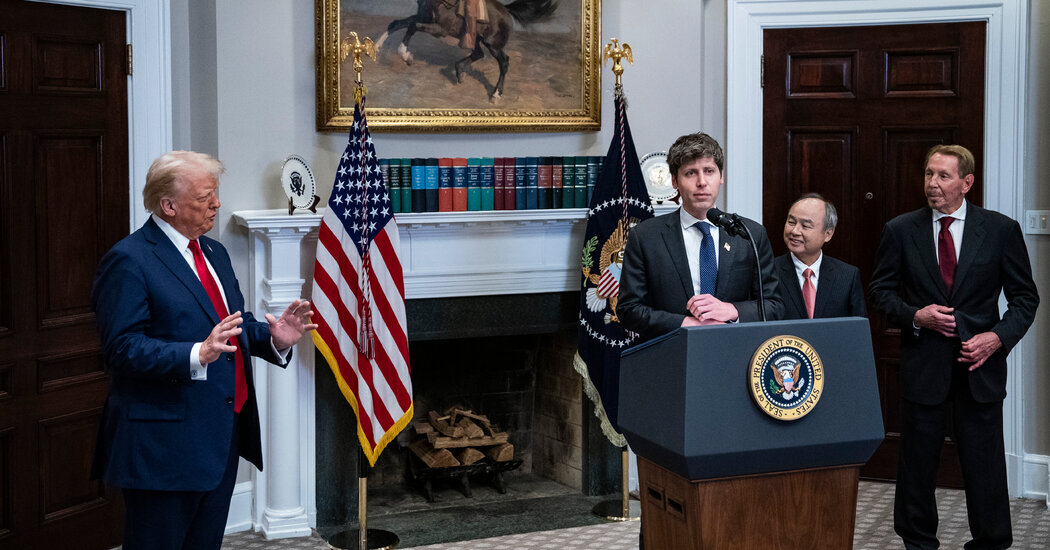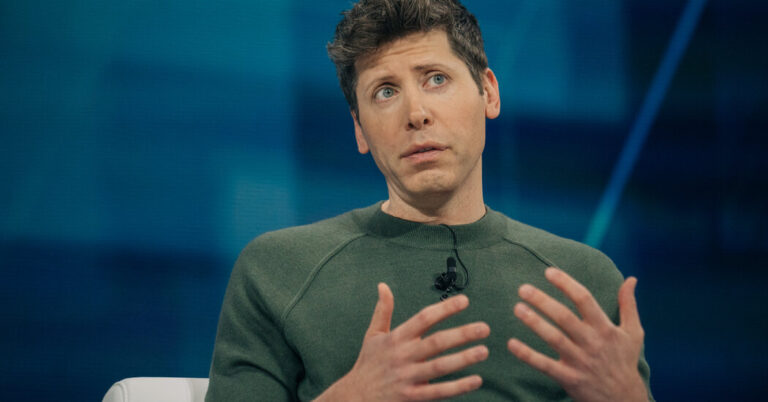Here is the plain text result:
At President Trump’s inauguration, Sam Altman, the chief executive of OpenAI, was relegated to the overflow room while other tech billionaires like Elon Musk and Mark Zuckerberg took prime spots on the dais under the Capitol rotunda.
But days earlier, before flying into Washington, Mr. Altman was on the phone with Mr. Trump, preparing an announcement that would outflank Mr. Musk and put Mr. Altman’s company at the center of the new administration’s agenda for artificial intelligence.
On the 25-minute call, Mr. Altman appealed to Mr. Trump’s love of a big story and of a big deal. Mr. Altman told the president-elect that the tech industry would achieve artificial general intelligence, the hypothetical moment when technology matches human intelligence, during the Trump administration, according to three people familiar with the call. And to get there before competitors from China, OpenAI, Oracle and SoftBank had completed a $100 billion deal to build data centers across the country.
The day after the inauguration, Mr. Altman stood behind Mr. Trump in the Roosevelt Room of the White House as Mr. Trump announced the deal, called Stargate, and described it as the “largest A.I. infrastructure project by far in history.”
Stargate had been in the works for months, but Mr. Altman and his partners timed the announcement to allow Mr. Trump to take credit for it in his first days in office.
“Earlier I was talking to Sam Altman, who’s a friend of mine, and I said, ‘Sam, this is a big deal. This is the biggest deal, the greatest deal,’ ” Mr. Trump said. “And he said, ‘I’m here to make it happen.’ And I think he’s going to make it happen. I think he’s going to do a fantastic job.”
Since Mr. Trump’s election, the billionaires of Silicon Valley have jockeyed to influence the new administration. None of them have been more successful than Mr. Musk, who backed the Trump campaign with more than $250 million of his own money and now apparently has the power to slash jobs and budgets across the federal government.
Mr. Altman, 39, was a longtime Democratic donor and loud critic of Mr. Trump during his first term. What’s more, he was near the top of Mr. Musk’s enemies list. The two had once fought for control of OpenAI, and are still battling it out in court. Mr. Musk also created his own A.I. company to compete head on with Mr. Altman’s company.
That Mr. Altman managed to outflank Mr. Musk and make OpenAI the centerpiece of the new administration’s nascent A.I. agenda to stay ahead of China was a testament to Mr. Altman’s talent for shape shifting and nearly two decades of deal making in Silicon Valley. It also offered a view of Mr. Trump’s flexible loyalties when it comes to being wooed, as well as the limits of Mr. Musk’s ability to influence tech policy.
Even before the presidential election, Mr. Altman quietly worked his way into Mr. Trump’s inner circle, according to interviews with more than a dozen people familiar with Mr. Altman’s drive to win over Mr. Trump. Many of the details of that courtship, which went on for months, have never been reported before.
The sentiment surrounding the deal changed after Trump was elected. Over the next several weeks, SoftBank, Oracle, and OpenAI each agreed to put money into Stargate, said three people familiar with the negotiations. They also secured funding from MGX, a tech investment firm controlled by the United Arab Emirates.
As the inauguration approached, many of Mr. Altman’s A.I. rivals met with the president-elect at Mar-a-Lago in Palm Beach, Fla. This included Mr. Musk and Mr. Zuckerberg, who has been giving away Meta’s A.I. technology in an effort to devalue OpenAI’s technology.
The best Mr. Altman could do was a meeting in Palm Springs outside of Mar-a-Lago with Howard Lutnick, Mr. Trump’s nominee for commerce secretary, according to three people familiar with the meeting.
After donating $1 million to Trump’s inaugural fund, Mr. Altman was invited to the inaugural festivities. But a mutual acquaintance — it is not clear who — arranged Mr. Altman’s Friday afternoon phone call with the president-elect, according to four people familiar with the arrangements.
On Inauguration Day, Mr. Altman, Mr. Ellison and Mr. Son were at the Capitol Building ceremony but were largely overlooked by the public. Early the next day, they gathered in a suite of the five-star Riggs hotel in Washington to map out how they would unveil their partnership to the world, according to four people familiar with the meeting.
Stargate partners rode in a caravan to the White House and walked to the visitor’s entrance for a public event they’d agreed upon in that earlier phone call with Mr. Trump. But they were left waiting in the 10-degree chill for 10 to 20 minutes. On Mr. Trump’s second day in office, there were problems with the White House computer system. And Mr. Ellison had forgotten his driver’s license, according to three people familiar with the moment.
Eventually, Mr. Altman, Mr. Son, and Mr. Ellison followed Mr. Trump into the Roosevelt Room. In his opening remarks, Mr. Trump referred again to the electricity demands of data centers, which he described as “big, beautiful buildings that are going to employ a lot of people.”
He introduced Mr. Altman, who was wearing a gray suit, blue tie, and American flag pin on his lapel, as “by far the leading expert, based on everything I read.”
That night, in a pair of posts to X, Mr. Musk attacked the deal, insisting that Mr. Altman and his partners did not have the initial $100 billion for their project, let alone the $500 billion they promised to eventually invest in the future.
The next day, Mr. Altman took to X with new observations about the president.
“I’m not going to agree with him on everything, but I think he will be incredible for the country in many ways!” he wrote.
The administration did not side with Mr. Musk. “The American people should take President Trump and those C.E.O.s’ words for it,” Karoline Leavitt, the White House press secretary, told Fox News the same day. “These investments are coming to our great country, and American jobs are coming along with them.”
Less than a week later, U.S. financial markets unexpectedly tumbled after a Chinese start-up called DeepSeek unveiled powerful A.I. technology that was built with fewer specialized chips than many experts thought possible. Pundits were questioning whether Stargate was the right move.
Mr. Altman flew back to Washington and had dinner with Republican lawmakers two days later. The next morning, he spoke at a private event with members of Congress, policymakers, and think tank leaders in the shadow of the Capitol, in a gleaming rented space close to the lobbying shops of Google and Amazon.
When Mr. Altman was asked what DeepSeek meant as he and his partners committed $100 billion to new data centers, Mr. Altman edited the question. “$500 billion,” he said. Then he answered it.
As companies like OpenAI continue to increase their computing resources, he said, their A.I. technologies continue to get better.
“We should want to keep doing that,” he said.
Source link




